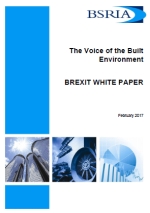BSRIA Brexit white paper
BSRIA is a non-profit distributing, member-based association, providing specialist services in construction and building services.
In February 2017, following consultation with its members and the wider industry, BSRIA published a Brexit White Paper, The voice of the built environment, identifying the key issues in the specific context of the built environment industry.
The White Paper points out the industry that supports the built environment has a major impact on the overall UK economy and plays a positive role in supporting the government’s climate change and emissions reduction objectives. But it is technology intensive, requiring a highly-skilled work force which takes years to train, and it is very dependent on international trade.
The White Paper suggests the major opportunities arising from Brexit are:
- The possibility of greater international trade.
- The possibility of a more streamlined regulatory environment.
- Increased motivation to boost the UK skills base.
The key threats are:
- The potential lack of access to skilled labour.
- The potential lack of access to the single market.
- Future divergence from, and lack of influence over, European standards and regulations.
- Uncertainty over future research funding in the UK.
The priority issues the government should prioritise in its negotiations are:
- Access to the remaining EU.
- International trade.
- Access to skilled labour from the remaining EU.
- Research funding.
- Standards and regulation.
- Skills funding.
BSRIA intends to embark on a programme of government and parliamentary engagement to ensure the industry’s voice is heard throughout the negotiation process.
Julia Evans, BSRIA Chief Executive, said: “There are several issues that are of severe concern to our industry. Without satisfactory resolution, these could have a large negative impact on the industry and the 562,000 people employed within it.
“Likewise, the EU negotiation and the UK’s new role in the world represent a real opportunity to strengthen and grow this vital industry with opportunities for greater international trade, better focussed regulation and developing a stronger indigenous UK skills base.
“The transitional period will undoubtedly be challenging and from time to time difficult, however, there is a sense of purpose around the subjects which affect this sector of the economy and they deserve and indeed demand attention.”
--BSRIA
[edit] Find out more
[edit] Related articles on Designing Buildings Wiki
- Architects' Brexit statement.
- Brexit.
- Brexit - the case for infrastructure.
- Brexit Topic Guide.
- BSRIA articles on Designing Buildings Wiki.
- BSRIA Brexit survey 2018.
- BSRIA calls for clarity following Brexit Article 50 High Court ruling.
- BSRIA response to Brexit speech.
- BSRIA response to Brexit white paper.
- HVAC and smart energy post-Brexit.
- Overcoming the challenges of Brexit.
- Post brexit, house building and construction remains a safe sustainable industry.
- Post-Brexit vision for construction.
- Triggering article 50 of the Treaty of Lisbon.
- What does Brexit mean for construction?
Featured articles and news
Apprenticeships and the responsibility we share
Perspectives from the CIOB President as National Apprentice Week comes to a close.
The first line of defence against rain, wind and snow.
Building Safety recap January, 2026
What we missed at the end of last year, and at the start of this...
National Apprenticeship Week 2026, 9-15 Feb
Shining a light on the positive impacts for businesses, their apprentices and the wider economy alike.
Applications and benefits of acoustic flooring
From commercial to retail.
From solid to sprung and ribbed to raised.
Strengthening industry collaboration in Hong Kong
Hong Kong Institute of Construction and The Chartered Institute of Building sign Memorandum of Understanding.
A detailed description from the experts at Cornish Lime.
IHBC planning for growth with corporate plan development
Grow with the Institute by volunteering and CP25 consultation.
Connecting ambition and action for designers and specifiers.
Electrical skills gap deepens as apprenticeship starts fall despite surging demand says ECA.
Built environment bodies deepen joint action on EDI
B.E.Inclusive initiative agree next phase of joint equity, diversity and inclusion (EDI) action plan.
Recognising culture as key to sustainable economic growth
Creative UK Provocation paper: Culture as Growth Infrastructure.
Futurebuild and UK Construction Week London Unite
Creating the UK’s Built Environment Super Event and over 25 other key partnerships.
Welsh and Scottish 2026 elections
Manifestos for the built environment for upcoming same May day elections.
Advancing BIM education with a competency framework
“We don’t need people who can just draw in 3D. We need people who can think in data.”























